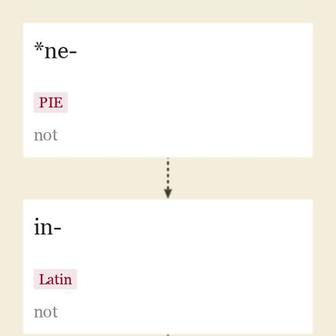inattention (n.)
"不注意,疏忽",1710年,来自 in-(1)"不,相反" + attention。可能是以法语 inattention 为模型。
最早记录年份: 1710
inattention 的相关词汇
attention (n.)
14世纪末, attencioun,"注意,积极地将思维集中在某个对象或主题上",源自古法语 attencion,直接来自拉丁语 attentionem(主格 attentio)"注意,专注",是动作名词,来自过去分词词干 attendere"注意",字面意思是"向前伸展",由 ad"到,向"(参见 ad-)+ tendere"伸展"(来自 PIE 词根 *ten-"伸展")。
17世纪前在英语中很少见。"考虑,细心关怀"的意思来自1741年; "礼貌,谦恭"的意思来自1752年。"心理集中的能力"的意思来自1871年。它与各种动词一起使用(pay, gather, attract, draw, call 等)。作为给出命令之前的军事警示词,可追溯到1792年。Attention span 来自1903年(早期的 span of attention,1892年)。相关词: Attentions。
in- (1)

这个词缀的意思是“不,相反,没有”(也可以是通过与后面的辅音音节化的 -n- 的同化而来的 im-, il-, ir-,这种趋势始于后期拉丁语),源自拉丁语 in- “不”,与希腊语 an-,古英语 un- 同源,均来自 PIE 词根 *ne- “不”。
在古法语和中古英语中,通常使用 en-,但大多数这些形式在现代英语中已经不再使用,只有极少数(例如 enemy)不再被视为否定的。在英语中的经验法则是,对于明显的拉丁语元素使用 in-,对于本土或本土化的元素使用 un-。